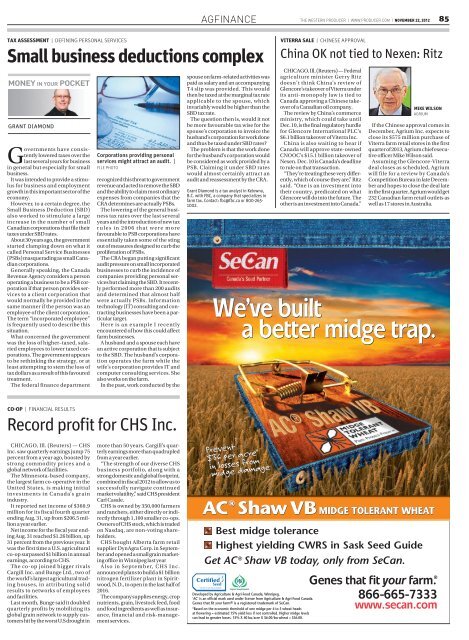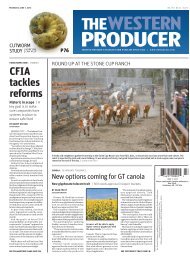Barn boss a referee and coach - The Western Producer
Barn boss a referee and coach - The Western Producer
Barn boss a referee and coach - The Western Producer
You also want an ePaper? Increase the reach of your titles
YUMPU automatically turns print PDFs into web optimized ePapers that Google loves.
MONEY IN YOUR POCKET<br />
GRANT DIAMOND<br />
Governments have consistently<br />
lowered taxes over the<br />
last several years for business<br />
in general but especially for small<br />
business.<br />
It was intended to provide a stimulus<br />
for business <strong>and</strong> employment<br />
growth in this important sector of the<br />
economy.<br />
However, to a certain degree, the<br />
Small Business Deduction (SBD)<br />
also worked to stimulate a large<br />
increase in the number of small<br />
Canadian corporations that file their<br />
taxes under SBD rates.<br />
About 30 years ago, the government<br />
started clamping down on what it<br />
called Personal Service Businesses<br />
(PSBs) masquerading as small Canadian<br />
corporations.<br />
Generally speaking, the Canada<br />
Revenue Agency considers a person<br />
operating a business to be a PSB corporation<br />
if that person provides services<br />
to a client corporation that<br />
would normally be provided in the<br />
same manner if the person was an<br />
employee of the client corporation.<br />
<strong>The</strong> term “incorporated employee”<br />
is frequently used to describe this<br />
situation.<br />
What concerned the government<br />
was the loss of higher–taxed, salaried<br />
employees to lower taxed corporations.<br />
<strong>The</strong> government appears<br />
to be rethinking the strategy, or at<br />
least attempting to stem the loss of<br />
tax dollars as a result of this favoured<br />
treatment.<br />
<strong>The</strong> federal finance department<br />
AGFINANCE<br />
TAX ASSESSMENT | DEFINING PERSONAL SERVICES<br />
Small business deductions complex<br />
CHICAGO, Ill. (Reuters) — CHS<br />
Inc. saw quarterly earnings jump 75<br />
percent from a year ago, boosted by<br />
strong commodity prices <strong>and</strong> a<br />
global network of facilities.<br />
<strong>The</strong> Minnesota-based company,<br />
the largest farm co-operative in the<br />
United States, is making initial<br />
investments in Canada’s grain<br />
industry.<br />
It reported net income of $360.9<br />
million for its fiscal fourth quarter<br />
ending Aug. 31, up from $206.5 million<br />
a year earlier.<br />
Net income for the fiscal year ending<br />
Aug. 31 reached $1.26 billion, up<br />
31 percent from the previous year. It<br />
was the first time a U.S. agricultural<br />
co-op surpassed $1 billion in annual<br />
earnings, according to CHS.<br />
<strong>The</strong> co-op joined bigger rivals<br />
Cargill Inc. <strong>and</strong> Bunge Ltd., two of<br />
the world’s largest agricultural trading<br />
houses, in attributing solid<br />
results to networks of employees<br />
<strong>and</strong> facilities.<br />
Last month, Bunge said it doubled<br />
quarterly profits by mobilizing its<br />
global grain network to supply customers<br />
hit by the worst U.S drought in<br />
Corporations providing personal<br />
services might attract an audit. |<br />
FILE PHOTO<br />
recognized this threat to government<br />
revenue <strong>and</strong> acted to remove the SBD<br />
<strong>and</strong> the ability to claim most ordinary<br />
expenses from companies that the<br />
CRA determines are actually PSBs.<br />
<strong>The</strong> lowering of the general business<br />
tax rates over the last several<br />
years <strong>and</strong> the introduction of new tax<br />
rules in 2006 that were more<br />
favourable to PSB corporations have<br />
essentially taken some of the sting<br />
out of measures designed to curb the<br />
proliferation of PSBs.<br />
<strong>The</strong> CRA began putting significant<br />
audit pressure on small incorporated<br />
businesses to curb the incidence of<br />
companies providing personal services<br />
but claiming the SBD. It recently<br />
performed more than 200 audits<br />
<strong>and</strong> determined that almost half<br />
were actually PSBs. Information<br />
technology (IT) consulting <strong>and</strong> contracting<br />
businesses have been a particular<br />
target.<br />
Here is an example I recently<br />
encountered of how this could affect<br />
farm businesses.<br />
A husb<strong>and</strong> <strong>and</strong> a spouse each have<br />
an active corporation that is subject<br />
to the SBD. <strong>The</strong> husb<strong>and</strong>’s corporation<br />
operates the farm while the<br />
wife’s corporation provides IT <strong>and</strong><br />
computer consulting services. She<br />
also works on the farm.<br />
In the past, work conducted by the<br />
CO-OP | FINANCIAL RESULTS<br />
Record profit for CHS Inc.<br />
more than 50 years. Cargill’s quarterly<br />
earnings more than quadrupled<br />
from a year earlier.<br />
“<strong>The</strong> strength of our diverse CHS<br />
business portfolio, along with a<br />
strong domestic <strong>and</strong> global footprint,<br />
combined in fiscal 2012 to allow us to<br />
successfully navigate continued<br />
market volatility,” said CHS president<br />
Carl Casale.<br />
CHS is owned by 350,000 farmers<br />
<strong>and</strong> ranchers, either directly or indirectly<br />
through 1,100 smaller co-ops.<br />
Owners of CHS stock, which is traded<br />
on Nasdaq, are non-voting shareholders.<br />
CHS bought Alberta farm retail<br />
supplier DynAgra Corp. in September<br />
<strong>and</strong> opened a small grain marketing<br />
office in Winnipeg last year<br />
Also in September, CHS Inc.<br />
announced plans to build a $1 billion<br />
nitrogen fertilizer plant in Spiritwood,<br />
N.D., to open in the last half of<br />
2016.<br />
<strong>The</strong> company supplies energy, crop<br />
nutrients, grain, livestock feed, food<br />
<strong>and</strong> food ingredients as well as insurance,<br />
financial <strong>and</strong> risk-management<br />
services.<br />
spouse on farm-related activities was<br />
paid as salary <strong>and</strong> an accompanying<br />
T4 slip was provided. This would<br />
then be taxed at the marginal tax rate<br />
applicable to the spouse, which<br />
invariably would be higher than the<br />
SBD tax rate.<br />
<strong>The</strong> question then is, would it not<br />
be more favourable tax wise for the<br />
spouse’s corporation to invoice the<br />
husb<strong>and</strong>’s corporation for work done<br />
<strong>and</strong> thus be taxed under SBD rates?<br />
<strong>The</strong> problem is that the work done<br />
for the husb<strong>and</strong>’s corporation would<br />
be considered as work provided by a<br />
PSB. Claiming it under SBD rates<br />
would almost certainly attract an<br />
audit <strong>and</strong> reassessment by the CRA.<br />
Grant Diamond is a tax analyst in Kelowna,<br />
B.C. with FBC, a company that specializes in<br />
farm tax. Contact: fbc@fbc.ca or 800-265-<br />
1002.<br />
THE WESTERN PRODUCER | WWW.PRODUCER.COM | NOVEMBER 22, 2012<br />
VITERRA SALE | CHINESE APPROVAL<br />
China OK not tied to Nexen: Ritz<br />
CHICAGO, Ill. (Reuters) — Federal<br />
agriculture minister Gerry Ritz<br />
doesn’t think China’s review of<br />
Glencore’s takeover of Viterra under<br />
its anti-monopoly law is tied to<br />
Canada approving a Chinese takeover<br />
of a Canadian oil company.<br />
<strong>The</strong> review by China’s commerce<br />
ministry, which could take until<br />
Dec. 10, is the final regulatory hurdle<br />
for Glencore International PLC’s<br />
$6.1 billion takeover of Viterra Inc.<br />
China is also waiting to hear if<br />
Canada will approve state-owned<br />
CNOOC’s $15.1 billion takeover of<br />
Nexen. Dec. 10 is Canada’s deadline<br />
to rule on that transaction.<br />
“<strong>The</strong>y’re treating these very differently,<br />
which of course they are,” Ritz<br />
said. “One is an investment into<br />
their country, predicated on what<br />
Glencore will do into the future. <strong>The</strong><br />
other is an investment into Canada.”<br />
MIKE WILSON<br />
AGRIUM<br />
85<br />
If the Chinese approval comes in<br />
December, Agrium Inc. expects to<br />
close its $575 million purchase of<br />
Viterra farm retail stores in the first<br />
quarter of 2013, Agrium chief executive<br />
officer Mike Wilson said.<br />
Assuming the Glencore-Viterra<br />
deal closes as scheduled, Agrium<br />
will file for a review by Canada’s<br />
Competition Bureau in late December<br />
<strong>and</strong> hopes to close the deal late<br />
in the first quarter. Agrium would get<br />
232 Canadian farm retail outlets as<br />
well as 17 stores in Australia.<br />
We’ve built<br />
a better midge trap.<br />
AC ® AC Shaw VB MIDGE TOLERANT WHEAT<br />
® Shaw VB MIDGE TOLERANT WHEAT<br />
Best midge tolerance<br />
Highest yielding CWRS in Sask Seed Guide<br />
Get AC ® Shaw VB today, only from SeCan.<br />
Developed by Agriculture & Agri-Food Canada, Winnipeg.<br />
‘AC’ is an official mark used under license from Agriculture & Agri-Food Canada.<br />
Genes that fit your farm® is a registered trademark of SeCan.<br />
*Based on the economic threshold of one midge per 4 to 5 wheat heads<br />
at flowering = estimated 15% yield loss if not controlled. Higher midge levels<br />
can lead to greater losses. 15% X 40 bu/acre X $6.00/bu wheat = $36.00.<br />
Genes that fit your farm. ®<br />
866-665-7333<br />
www.secan.com








